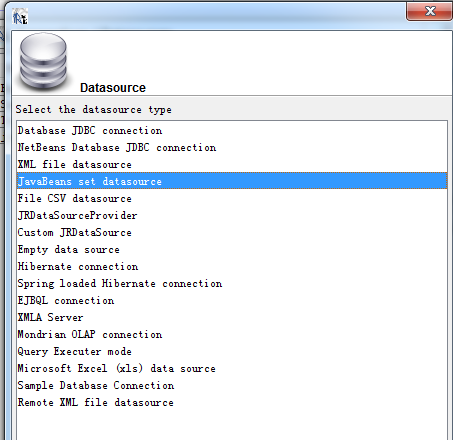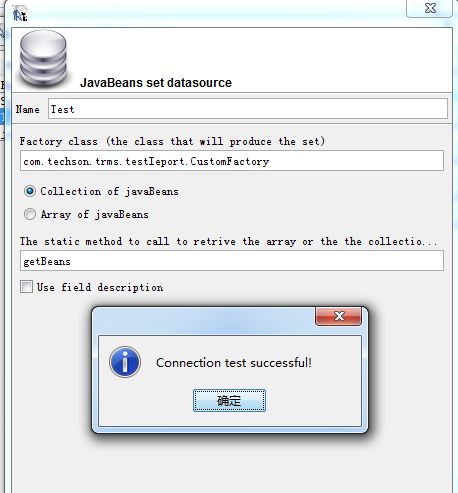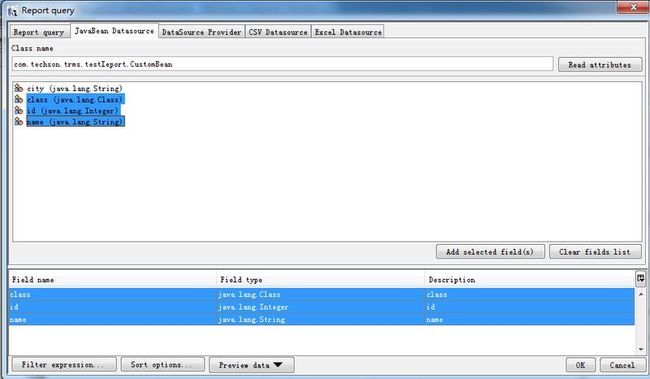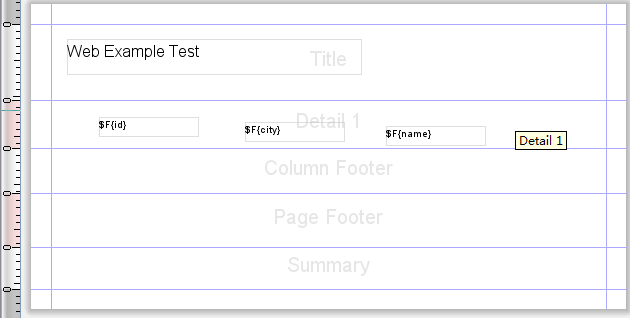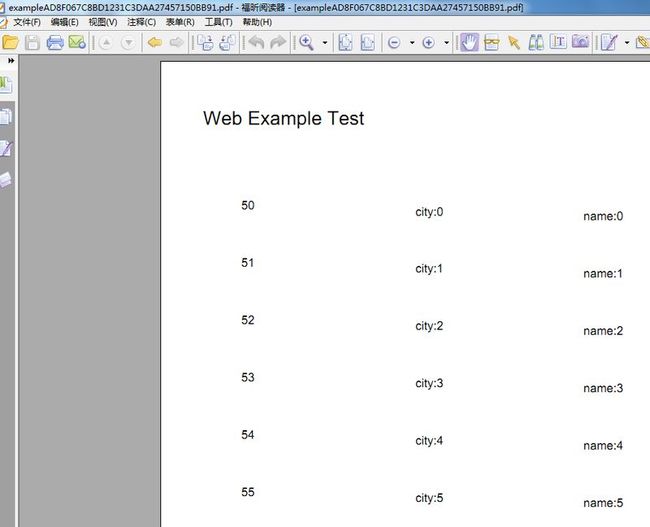使用报表开发工具Ireport生成Pdf报表的总结
一、个人总结
要使用Ireport,首先都要配置生成模版,小弟到目前为止只用过两种方式,一种是使用JDBC数据源方式,就是在Ireport里写SQL语句,将需要的字段在SQL语句里输出出来,然后再拖拉构造模版文件。当报表比较复杂时,这种情况就需要写一些非常复杂的SQL语句,刚开始学习用Ireport时,以为只能这样生成模版,每天写一大堆SQL,很容易错不说,还弄得人头昏脑胀,痛不欲生啊,所幸,Ireport还有使用JavaBean作为数据源的方式。这两种方式使用起来个人感觉最主要的区别就是
JavaBean方式:
JRDataSource dataSource = new JRBeanCollectionDataSource(mapList); JasperReport jasperReport = (JasperReport) JRLoader.loadObject(file); jasperPrint = JasperFillManager.fillReport(jasperReport, null, dataSource);
这种方式使用的是JasperFillManager.fillReport(jasperReport, parameters, dataSource),其中dataSource是通过传入的对象列表List<T>构造的 。
而JDBC方式:
Class.forName("com.mysql.jdbc.Driver");
Connection conn= DriverManager.getConnection("jdbc:mysql://localhost/test","root","root");
JasperFillManager.fillReport(jasperReport, parameters, conn);
InputStream inputStream = getServletConfig().getServletContext().getResourceAsStream("report.jasper");
JasperPrint jasperPrint = JasperFillManager.fillReport(inputStream, parameters,connection);
这这种方式使用的是JasperFillManager.fillReport(jasperReport, parameters, connection)、JasperFillManager.fillReport(inputStream, parameters, connection)最后一个参数是JDBC中的Connection
二、生成模版
JDBC方式比较简单,就不介绍了。下面只介绍JavaBean模式(小弟比较懒,下面只讲重点,废话就不多说了):
1、新建一个JavaBean类:
package com.techson.trms.testIeport;
public class CustomBean {
private String city;
private Integer id;
private String name;
public String getCity() {
return city;
}
public void setCity(String city) {
this.city = city;
}
public Integer getId() {
return id;
}
public void setId(Integer id) {
this.id = id;
}
public String getName() {
return name;
}
public void setName(String name) {
this.name = name;
}
}
2、配置Ireport的ClASSPATH为编译好的.class文件的路径 ,如图:
3、指定数据源:
在网上看到许多网友的这步的配置,发现有两种情况,一种是使用默认的数据源,一种是自己配置的数据源,刚开始时,还以为其中有一个错了,后来才发现,其实这根本没有关系的,只不过使用自己配置的数据源的,Preview时可以显示出预览数据,仅此而已。
默认数据源:
自己定义的数据源:
新建CustomFactory 数据源类:
public class CustomFactory {
public static Collection<CustomBean> getBeans(){
List<CustomBean> list = new ArrayList<CustomBean>();
for(int i = 0 ;i<12;i++){
CustomBean c = new CustomBean();
c.setCity("city:"+i);
c.setId(i+50);
c.setName("name:"+i);
list.add(c);
}
return list;
}
}
Factory class(the class that will produce the set): 为自己的CustomFactory的全路径。
下面输入的是类中定义的静态方法。
4、获取属性
在JavaBeanDataSource中输入自己新建的Bean类的全路径,点“Read Attributes” ,读取属性,选中需要的属性,加入到下面,然后点“OK”:
5、往模版中拖拉属性:
大致意思一下,咱主要说功能,美观方面就先不说了,呵呵。保存,模版文件example.jasper就生成了。可在Ireport中直接编译生成jasper文件,也可由程序自己生成。
三、项目中使用模版生成PDF文件
直接上代码:
点击“导出到PDF”
function doExport(){
var time = new Date();
window.open("<%=path%>/printEmail.do?doAction=pdf&time="+time,"window","menubar=no,status=no,resizable=no,scrollbars=1,width=800pt,height=600pt,top=100,left=300");
}
进入这个Action(小弟用的是struts1,比较老,呵呵):
@Override
public String process(ActionForm form, HttpServletRequest request)
throws Exception {
HttpSession session = request.getSession();
List<CustomBean> list = new ArrayList<CustomBean>();
for(int i = 0 ;i<12;i++){
CustomBean c = new CustomBean();
c.setCity("city:"+i);
c.setId(i+50);
c.setName("name:"+i);
list.add(c);
}
String fileName =createPDFByXmlName("example", list, session);
session.setAttribute("PDFNAME", fileName);
return "success";
}
public static String createPDFByXmlName(String reportName, List mapList,HttpSession session) throws UnsupportedEncodingException, JRException {
String path = "WebRoot/reports";
if (session != null) {
path = session.getServletContext().getRealPath("reports");
}
JasperReport jasperReport;
JasperPrint jasperPrint;
try {
File file = new File(path + "/" + reportName + ".jasper");
//如果jasper文件不存在,就调用jrxml文件编译生成
//JasperCompileManager.compileReportToFile(String sourceFileName, String destFileName)
if (!file.exists()) {
JasperCompileManager.compileReportToFile(path + "/"+ reportName + ".jrxml",path + "/"+ reportName + ".jasper");
}
jasperReport = (JasperReport) JRLoader.loadObject(file);
JRDataSource dataSource = new JRBeanCollectionDataSource(mapList);
//此处为关键,将对象列表设为数据源
jasperPrint = JasperFillManager.fillReport(jasperReport, null, dataSource);
//因模版上没有传入参数,所以此处第二个参数为空
String fileName = "pdf/"+reportName+session.getId()+".pdf";
File fi = new File(path+"/pdf");
if(!fi.exists()){
fi.mkdir();
}
//生成方法1
JRPdfExporter exporter = new JRPdfExporter();
exporter.setParameter(JRPdfExporterParameter.JASPER_PRINT, jasperPrint);
exporter.setParameter(JRPdfExporterParameter.CHARACTER_ENCODING,"UTF-8");
exporter.setParameter(JRPdfExporterParameter.OUTPUT_FILE_NAME, path+"/"+fileName);
//注意此处用的不是JRPdfExporterParameter.OUTPUT_FILE,要用这个,还需新建File
exporter.exportReport();
//生成方法2
try {
JasperExportManager.exportReportToPdfFile(jasperPrint,path+"/"+fileName);
} catch (Exception e) {
e.printStackTrace();
}
session.getServletContext().setAttribute("FilePath", path+"/pdf");
return fileName;
}catch(JRException e){
e.printStackTrace();
throw new JRException(e);
}
}
代码注释里写的很详细了。。。
其实到这就已经介绍完了,不过既然写了,就弄完吧,o(∩_∩)o 哈哈
成功后跳转:
<action path="/printEmail" type="com.techson.trms.struts.action.PrintEmailAction"> <forward name="success" path="/printEmail.jsp" /> </action>
printEmail.jsp文件:
<%@ page language="java" import="java.util.*" pageEncoding="utf-8"%>
<%
org.apache.commons.logging.Log log = org.apache.commons.logging.LogFactory
.getLog("print.jsp");
log.warn(" enter print.jsp");
String path = request.getContextPath();
String basePath = request.getScheme()+"://"+request.getServerName()+":"+request.getServerPort()+path+"/";
%>
<!DOCTYPE HTML PUBLIC "-//W3C//DTD HTML 4.01 Transitional//EN">
<html>
<head>
<script type="text/javascript">
function init(){
var time = new Date();
var url='<%=basePath %>'+"reports/"+'${PDFNAME}'+"?doAction=pdf&time"+time;
window.location.href=url;
}
</script>
</head>
<body onload="init();">
最后实现的效果是点击导出PDF文件后,弹出一个浏览器框,提示下载。
最后效果:
This is all ! o(∩_∩)o 哈哈
另:
实际调试中发现代码到编译jrxml文件为jasper文件时死活过不去,替换了groovy.jar架包为groovy-1.5.7.jar后,还不行,又替换为本文所使用的Ireport3.7.6中的groovy-all-1.7.5.jar,编译通过!Game Over !

